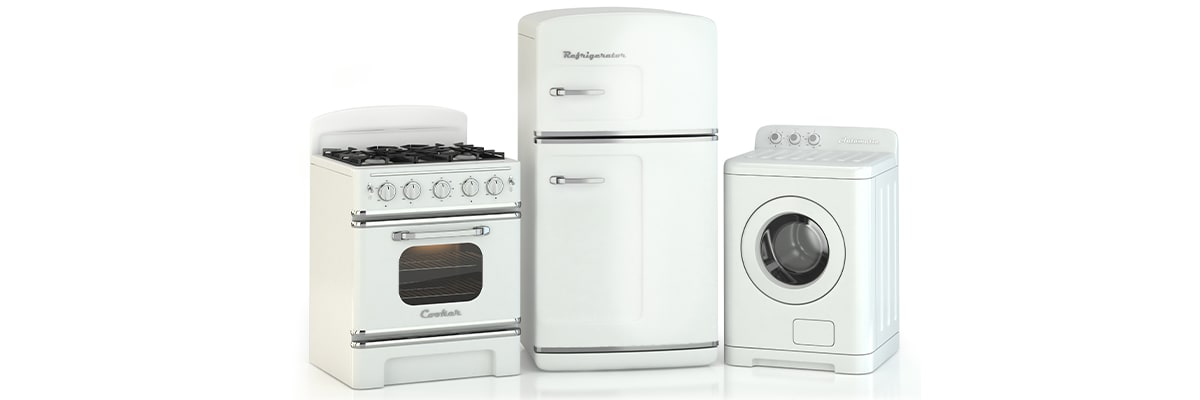
Return navigate_next
How to Donate, Recycle, or Sell Old Appliances
July 13, 2022 *
The lifespan of appliances is determined by several factors, including the manufacturer, how frequently they’re used, and maintenance. But, on average, most appliances last around 10 years. That said, there are some cases where appliances can last 20 or even 25 years.
The question is, what do you do with appliances that still work but you’re done using them? You have three main options — donate, recycle, or sell old appliances.
How to Donate Old Appliances
If an appliance is still in working order but you’re ready to replace it, this is a good option to consider. When you donate the appliance, it goes to a good cause and helps clear out space in your home. Typically, the easiest way to donate old appliances is to take them to a local thrift store, such as Goodwill, the Salvation Army, or the Habitat for Humanity ReStore.

Goodwill and the Salvation Army accept a wide variety of items — pretty much everything in a household. And most will gladly accept used appliances as long as they’re still functional and in reasonably good condition. The Habitat for Humanity ReStore specializes in household items like furniture, shelving, and appliances, so they’re always a good choice for large, bulky items like dishwashers and ovens. You can also check with local “mom and pop” thrift stores and churches as well.
In some locations, these organizations may even pick up your old appliances, which is why it’s worth checking before lugging them around yourself. Also, note that you can often get a tax deduction by donating appliances, which can put some extra money in your pocket come tax season.
How to Recycle Old Appliances
Typically, the best place to start is with your local waste management authority. “They might offer a bulk collection or appliance recycling program, in which you specify the type of appliance and schedule a pickup,” explains Treehugger Magazine. “Even if they don’t offer the service, they’re in a good position to point you in the right direction.”

If that doesn’t work, you can contact the retailer you purchased the appliance from or your local electric utility provider, as some participate in the Responsible Appliance Disposal (RAD) program. They’ll ensure proper disposal protocol is followed to ensure harmful substances like freon from refrigerators don’t contaminate the environment
How to Sell Old Appliances
If an appliance is in fair condition or better, you can try selling it in a yard sale, through the Facebook marketplace, or on Craigslist. Those are all good starting points.
For smaller appliances, however, another option is eBay, which is nice because you have access to a much larger customer base. Note that you can sell large appliances like refrigerators, but shipping and handling are often a hassle. In addition, reselling the appliance to a local retailer can work in some cases as long as it’s in good condition and you don’t mind selling it at a steep discount.
Finally, for appliances that are in poor condition, you can potentially sell them for scrap. To find buyers, try contacting local repair shops to see if there’s any demand. And they may even remove the item for free.

The Importance of an Extended Warranty
As we mentioned earlier, the average appliance lasts around 10 years. But there are never any guarantees. Because most manufacturers’ warranties for appliances only last one to three years, it’s smart to have extended coverage. This overlaps with the manufacturer’s warranty and goes into full effect once the manufacturer’s warranty expires to keep you covered long-term.
Buying extended coverage from big name brands and retailers has been the traditional choice for many consumers. However, big-brands and retailers often inflate their warranty prices, meaning that consumers pay too much for basic coverage. Many consumers are now opting for more innovative options like Upsie.
Upsie offers extended coverage on a wide range of appliances, such as dishwashers, refrigerators, washers and dryers, ovens, and more. Terms and conditions are fully transparent, and you can choose from several options to find the perfect coverage without overspending.
You also have full control of your plans on Upsie.com in case you ever need to make changes, and claims can be made 24/7 for quick repair or replacement. In addition, Upsie’s warranty prices cost up to 70% less than most in-store brands. As a result, you can save money without compromising quality.
Learn More About Appliances:
* This article is over 6 months old and may or may not be updated.
